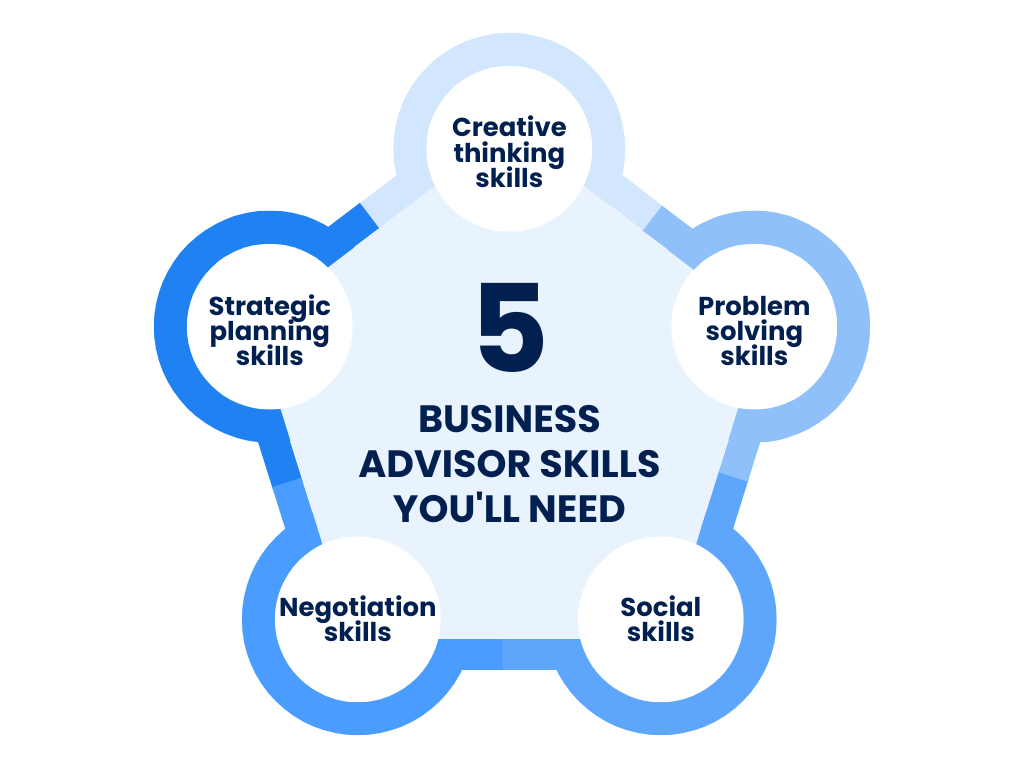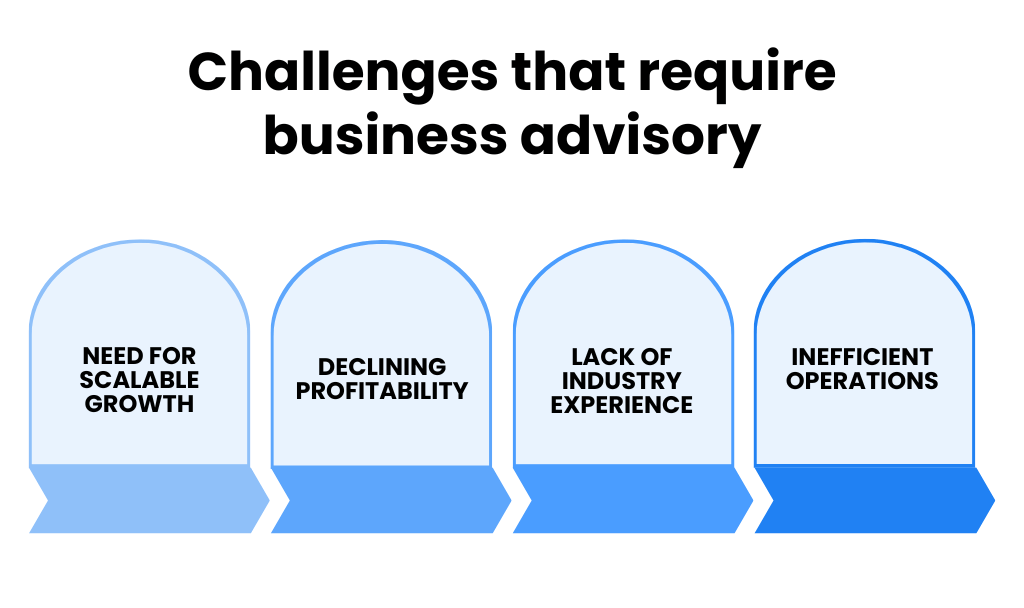To make your business successful, it’s not enough to just dream; you need strategic thinking and practical skills. However, sometimes solving complex business problems requires expertise beyond your own. But what does business consulting have to do with it?
These experts provide valuable knowledge and insights to help you tackle challenges and make the most of opportunities. Let’s take a closer look at what it is and why it’s important for any type of business.
Contents:
3. Core business advisory services
4. Data-driven decisions: How can Synder Insights help?
5. Selecting a business advisor for your company
6. Industry-specific advisory services
7. Challenges that require business advisory
8. FAQs
Key takeaways
- Business advisors help companies tackle challenges like declining profits, operational issues, and lack of industry expertise.
- They offer fresh perspectives, specialized expertise, and strategic advice to navigate complex situations.
- Advisors cater to businesses of all sizes and industries, providing solutions to their specific needs.
What is business advisory?
Business advisory acts as an important support system for companies or organizations seeking success. Using their experience, these specialists provide invaluable advice tailored to each client’s needs. They play an important role in helping companies formulate and implement strategic plans aimed at driving overall growth and solving problems effectively.
For example, if you’re launching a new product and feeling overwhelmed, a business advisor can step in to help with marketing strategies, freeing up your time to manage other aspects of your business. Same goes for any sphere, including accounting.
Is business advisory the same as consulting?
These two concepts are similar and are often used interchangeably. But what’s the difference?
Consultants and advisors have distinct roles when it comes to problem-solving. Consultants specialize in identifying or defining problems within a business or organization. On the other hand, advisors are focused on developing customized solutions to address these identified issues effectively.
If you want to have a clearer comparison, consultants act as detectives, uncovering problems, while advisors serve as problem-solvers, crafting tailored fixes suited to the circumstances. Basically, their goals are very similar, and we see them as complementary concepts.
Types of business advisors
There are more than 85K business consultants in the United States helping companies thrive. These consultants are of different types: internal consultants who work within the company and external consultants brought in from outside. Both play a critical role in supporting business growth.
Internal business advisors
Internal advisors are part of the company, typically they work full-time in an office, although some may engane in a remote work. These advisors have two primary responsibilities:
- They analyze the organization to identify areas where improvements are needed, such as increasing employee satisfaction, improving management practices, or optimizing profits.
- Develop and implement solutions to solve these problems.
Businesses appreciate internal advisors because they work closely with different departments, quickly identifying areas for improvement or restructuring. This close collaboration enables them to implement strategies to meet the company’s specific goals and requirements.
External business advisors
An external advisor is a specialist who either works independently or for another organization. When a business hires their services, the consultant works on the project until its completion, after which they move on to work with other clients.
External consultants typically possess broad knowledge of their industry due to their experience working with various clients. They bring an outside perspective to the table and offer unique solutions to problems.
| Aspect | Internal business advisors | External business advisors |
| Employment status | Full-time employees within the company | May work independently or for another organization |
| Work environment | Typically office-based, some may work remotely | Varies, can work from their own office or client locations |
| Scope of work | Focus on internal operations and company culture | Offer external perspectives and solutions |
| Knowledge and experience | Have deep understanding of company dynamics and culture | Bring broad industry knowledge from working with various clients |
| Collaboration | Work closely with different departments within the company | Collaborate with clients and offer solutions based on expertise |
Core business advisory services
1. Strategic planning
In strategy planning, an advisor helps businesses to create and realize an accurate plan. This plan sets the overall direction of the business for the future and provides a roadmap detailing steps to achieve long-term goals. From venturing into new areas and demographics to expanding the geography of sales, everything needs a plan, and a good advisor will nudge you in the right direction.
2. Accounting advisory
Accounting advisory services provide expert support in tasks such as financial reporting and compliance. They can also help to optimize your accounting processes. These services are tailored to your specific needs, whether you are adopting accounting standards or dealing with complex financial issues.
For example, your SaaS business needs GAAP compliant revenue recognition, the thing too difficult to figure out on your own. Advisors will help you approach recognizing revenue correctly, ensuring everything is spot-on.
3. Risk management
Risk management services can help you identify and minimize potential risks to your business. By analyzing risks and making strategic plans, they enable you to protect your company’s assets and reputation. Risk management is critical to guiding your business through times of uncertainty and ensuring it remains resilient and flexible in the face of challenges.
Let’s say your business begins to increase sales and you don’t know what’s going to happen next. Risk management can help you identify potential risks, such as staff shortages or equipment failures.
4. Operations management
Operations management is crucial for a successful business. It involves coordinating and improving all processes, like production and distribution, to run smoothly. By working efficiently and adapting to changes, businesses can thrive and keep growing.
For instance, your business is growing and prospering. But as the volume of work increases, so does the complexity of work processes, which are difficult to manage alone. Operations management can solve this problem by organizing and following a plan, the work becomes more orderly.
Data-driven decisions: How can Synder Insights help?
For businesses of all sizes and consultants who support them, the ability to make informed decisions is not only beneficial, but critical to success. That’s why Synder Insights, a plug-n-play data analytics tool offering a comprehensive overview of sales, product and customer performance, is a great solution to improve strategic decision-making.
Synder Insights goes beyond simple data or numbers in a spreadsheet. It serves as a gateway to uncover hidden patterns, trends and opportunities. For example, you can use the top performing product feature. This tool allows you to sort them by earnings, sales, and other categories. This helps you identify top performers and decide where to focus your marketing efforts. You can also see how your products perform in different regions and platforms to understand where your revenue comes from.
Synder Insights doesn’t stop with your best-sellers, it gives an in-depth analysis of a business’s performance across other major KPIs on a single dashboard, serving as a source of truth for the company’s data.
Attend Synder’s Weekly Public Demo to learn more about Synder, or create a free account to experience the tool firsthand.
Selecting a business advisor for your company
Business advisor skills you’ll need
A business consultant requires a range of skills to effectively help companies achieve their goals. But what are they and how can your company benefit from them?

- Creative thinking skills
As your company expands, you face unique obstacles that require creative problem solving to maintain growth. Sometimes you just reach a dead end and seek outside help to overcome these problems and continue to progress.
These problems, although varied, often don’t have a clear solution due to a lack of existing data or research. Advisors rely on their experience and intuition to brainstorm innovative ideas and strategies. They also bring together a diverse team from across the company to bring fresh perspectives and promote a collaborative approach to problem solving.
- Problem solving skills
Business consultants must effectively deal with unexpected and complex situations. Having these problem-solving skills allows business consultants to better solve client problems. This proactive approach lets them provide comprehensive solutions.
For example, your company has decided to merge with another, you have prepared all the documents, but your partners do not agree with them. In this case, the business advisor must take on this problem and reach an agreement between the two parties.
- Communication or social skills
Research found that 60 percent of companies do not have a long-term internal communications strategy at all. Effective communication is critical to the smooth running of a business, and consultants must master this skill to ensure the safety of clients. Their role requires managing teams, making presentations and coordinating activities. Failure to communicate effectively can result in project delays or even loss of clients.
- Negotiation skills
Although you can learn to negotiate overtime, the most successful deals often happen when you have a good negotiator on board. What sets a great negotiator apart from the rest? Experience. Having effective negotiation skills has a lot to do with the advisor’s communication skills. Those who have experience in negotiations know how to say the right words at the right time.
- Strategic planning skills
Not all company employees understand the strategy of their organization. Some organizations fail to take a strategic approach to their future direction, leading to problematic transitions and disagreements among team members. To solve this, advisors can create a strategy map as a graphical representation of the strategies they have discussed with planning teams.
If you think that your business needs a good accountant advisor and you can’t find one, then you can browse our directory of qualified accountants and choose your specialist.
Questions to ask before hiring
1. What is your qualification?
First things first, and most of the time business owners start with questions about the consultant’s years of experience, as well as the degrees and certifications they have earned. This information will help you evaluate their experience and suitability for your specific needs. Also, don’t hesitate to ask for clarification if you’re unsure of a specific qualification, as a reputable advisor will be happy to provide explanations to ensure transparency and trust.
2. How can you save my time?
Many small business owners turn to business consultants because they face limited time and resources. When selecting a potential consultant, ask them exactly how they can solve this problem. An experienced professional will explain how they can lighten your workload, allowing you to focus on your core strengths. Hiring a consultant who ends up adding unnecessary tasks to your workload is the last thing you want to do.
3. What types of companies have you worked with?
When considering an advisor, it’s vital to know who they’ve worked with before and what results they’ve delivered. Ask if they’ve worked with businesses like yours in the past, as this familiarity can be beneficial. While many financial strategies are universal, having industry-specific experience could make a difference.
4. How do you tailor your services to fit my needs?
It’s important to ask about the advisors’ process with clients, what qualities they prioritize and how well they listen. Some advisors may simply tell you what to do, but the good ones will take the time to listen to your concerns and provide personalized recommendations based on your specific needs.
Industry-specific advisory services
For startups
Consultants play a keyl role in today’s startups development, offering more than just a prestigious name. Startup-specific industry advisory services provide targeted advice to address the unique challenges new businesses face. These consultants specialize in areas such as go-to-market, product development, financing and growth strategies, helping startups build a strong foundation for success in their industries.
For small and medium enterprises
Advisory services for small and medium enterprises (SMEs) are essential for helping these businesses navigate the complexities of the market. These advisors focus on optimizing operations, improving competitiveness, and fostering sustainable growth tailored to the specific challenges faced by SMEs. Enterprise business advisors provide guidance across various areas including strategic planning, financial management, marketing strategies, and talent development.
For large corporations
When it comes to corporations, the stakes are getting higher. Specialized advisory services for large corporations provide strategic information, innovative solutions and operational expertise to help companies adapt to market changes, seize new opportunities and maintain their competitiveness. In addition, advisors offer support in risk management, regulatory compliance and stakeholder engagement, ensuring that corporations remain flexible and resilient to changing market dynamics.
Challenges that require business advisory

Need for scalable growth
As your company grows, having an experienced consultant is a must. They will help you adapt quickly, improve your team organization, and expand important leadership roles. With their experience and track record of success, they create a customized plan to achieve your goals and set benchmarks to track your progress.
There are also dire consequences in situations when you decide you don’t need any help or hire the wrong person for the job. Without proper business advisory, you may run into problems. Adapting to growth may be slower and organizing your team may be problematic. You may find it difficult to expand your leadership role, and tracking progress toward your goals may become unclear.
Declining profitability
Facing declining profits can be challenging, but a business consultant can help by offering a fresh perspective. They can identify blind spots in areas like personnel, operations, sales, and finances, providing strategic recommendations to make a difference.
If you don’t tackle these challenges, things could get worse. Your business might keep losing money, causing problems for your staff and possibly leading to shutting down. Ignoring these issues could also harm your reputation and make it tough to attract customers or get financial help later on. It’s important to take action and get help to deal with these problems before they get out of hand.
Lack of industry experience
When working in a new industry, the assistance of a consulting specialist with relevant experience can be invaluable. Their deep understanding of industry situations, trends and competition can provide important insights to effectively navigate challenges. With their knowledge, you can develop a robust strategy that takes into account the nuances of your industry.
Inefficient operations
When addressing operational inefficiencies, experienced consultants offer valuable insights. They carefully analyze your organization, identifying problems such as product design flaws, production bottlenecks, and areas of waste or quality problems.
If you don’t seek help to fix operational issues, you might find it hard to spot and solve problems. Without business advisors expertise, you could waste resources and slow down your work.
Conclusion
Business consulting services are necessary to help companies cope with various problems and achieve their goals. Whether it’s strategic planning, operational optimization or industry consulting, consultants offer valuable experience and assistance. From startups to large corporations, businesses can benefit from information provided by both internal and external consultants.
By understanding their specific challenges and leveraging the expertise of consultants, companies can overcome obstacles, drive growth, and thrive in today’s tough competition.
FAQs
What is the purpose of advisory services?
Business advisory services focus on supporting companies or organizations to achieve success through new business ideas and strategies. They offer guidance and assistance in formulating strategic plans that promote overall growth.
How do I know if I need a business consultant?
When a company faces complex or difficult problems beyond its expertise or resources, it should consider hiring a business or management consultant. These problems may include declining revenues, high employee turnover, lack of innovation, or poor leadership.
Why is business advisory important?
Business advisory services provide several advantages, such as minimizing risks, improving profit management, exploring new opportunities, and efficiently addressing various business issues. With their deep understanding of finance, advisors offer reliable advice on managing risks effectively.
Share your thoughts
Have you ever used business advisory services, and if yes, how was your experience? Do you consider understanding the operational aspects of business advisory important for business owners and managers? Feel free to share your insights in the comments below.






